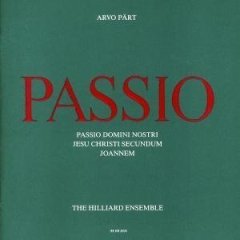Arvo Part – Passio (1988)
Arvo Part – Passio (1988)

1. Passio Domini Nostri Jesu Christi Secundum Joannem
Performer:
The Hilliard Ensemble
Arvo Part has become something of a cottage industry now, with most of his pieces enjoying multiple recordings. The shorter works are especially friendly to new agers, with their quiet moods and sombre spiritual atmosphere. But at his most austere, Part is still a radical and more challenging than an mere aquaintance with works like Spiegel Am Spiegel would lead one to believe. His long works can be as sonically challenging as anything written in the past 50 years, even as they askew atonality, harsh dissonance and complex rhythm. In their very simplicity is their challenge.
Part's St. John Passion is probably his masterwork. Written early in his tintintabulation style (the slow, bell like sonorities and block chords for which he has become famous) this work was produced before the style became too stultifying, while the inspiration was still fresh. Those looking for a dramatic Passion in the tradition of Bach would do best to look elsewhere. (Penderecki would be a good choice. Or James MacMillan's Triduum orchestral series.) Part takes his inspiration from earlier musical dramatizations of the Passion, at times drawing from the tradition of medieval liturgical drama and the passions of Heinrich Schutz. As a result, the work is austere, as were those earlier works, more meant for a worship service than the concert hall. The Evangelist sections are sung by a quartet accompanied by a varying chamber ensemble. Their music resembles nothing so much as the music from Satie's Socrate. It's very lack of passion heightens the emotion of the entire work. Peter, Pilate and Jesus are sung by baritone, tenor, and bass soloists respectively. Jesus' music is particularly effective, slowing down with each utterance on the cross. The choral writing has some of the language of Stravinsky's sacred works and is perhaps the most dramatic element of the entire work. And after Christ's death, sung exquisitely by the Evangelist ensemble on a single quiet note, the choir and organ enter in the first major mode of the work, building to a blazing amen. This moment alone is worth the entire CD and I believe could not be as effective without the austerity of the rest of the work.
Part of the difficulty of appreciating this masterwork is our societal expectation that things be "full of something". Full of drama, full of sound, full of distracting events. Part's music, by it's sheer length and simplicity of means, challenges us to listen differently, not for distraction but for something deeper. This work should not be listened to as a "concert piece" but rather as a religious ceremony. I tend to dust it off only once a year during Holy Week. Taken in that context, the work is unlike anything else, and a journey deep into the central mystery of the Christian Faith, without any dramatic trappings or adornments. It's a journey well worth taking. --- Christopher Forbes
download (mp3 @192 kbs):
yandex mediafire mega uloz.to 4shared cloudmailru gett hostuje
Zmieniony (Sobota, 30 Wrzesień 2017 21:39)








